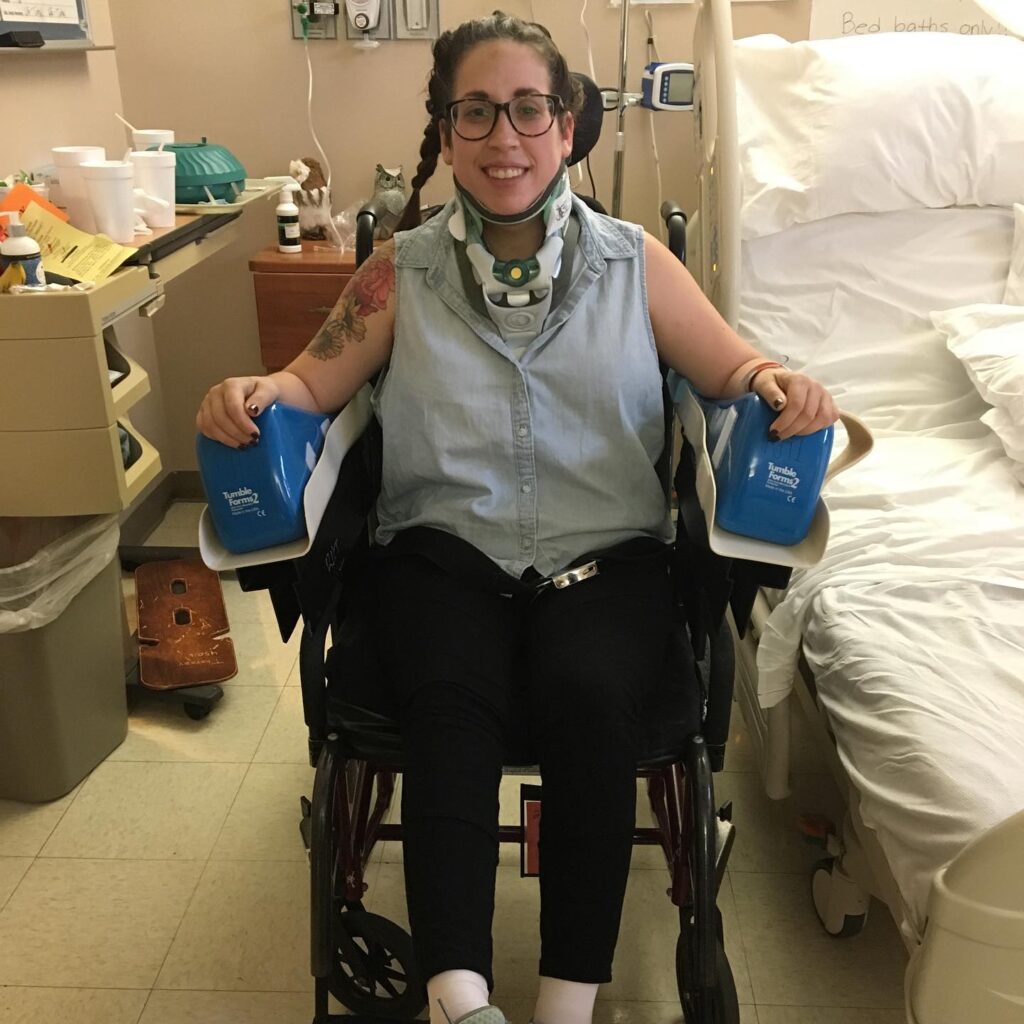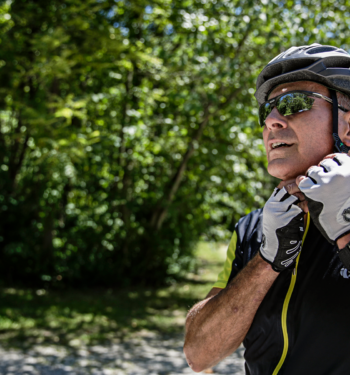
July 29, 2020
In September 2018, Tera Vogl of Franklin, Indiana, was driving her husband, Jamie, back to Camp Atterbury the night before his graduation ceremony—a trip they had taken many times. At a stoplight less than five minutes from their home, their car was rear-ended by a truck traveling over 50 miles per hour. Tera and Jamie’s car was pushed into a ditch, where it rolled over several times.
After being extricated from the car by hydraulic rescue tools and transported to the hospital, it was discovered that Tera suffered multiple severe injuries to her body including fractures of her spine. The most serious of these fractures involved the vertebrae and ligaments between the skull base and upper spine – also known as internal decapitation.
An internal decapitation, or atlanto-occipital dislocation, occurs when ligaments in the spinal column separate from the skull base. Only 30% of people survive this injury, and those who do usually suffer from paralysis or other neurological complications for the rest of their lives.
Upon being rushed to the hospital, Goodman Campbell Brain and Spine neurosurgical specialist Dr. Shannon McCanna was called to perform two spinal fusion surgeries to limit the physical and neurological damage as much as possible.
“The first time I saw Tera was in the ICU when she was completely paralyzed, only able to communicate with eye movements. Surgery was being delayed because she wanted to breastfeed her child before she went under anesthesia,” said Dr. McCanna. “She was facing so much uncertainty, but wanted to care for her child. It was absolutely heartbreaking to see because most people with her degree of injury normally don’t make a meaningful recovery.”
Tera spent several weeks in recovery, physical therapy, and speech therapy dealing with rebuilding muscles and relearning how to talk and walk. After a couple months of intense therapy sessions, Tera surprised Dr. McCanna during a postoperative appointment by actually walking into the room.
“When she left the hospital to go to rehab, she was still in a condition that I thought she would need long-term support for her most basic needs,” said Dr. McCanna. “So when she came into my office walking on the first postoperative visit, my mind was blown. She has such a determination and inner strength.”
While Tera was able to go home, she still had issues with fine motor skills, long-distance walks, double vision, and headaches. Over a year later, Tera has built up her endurance so she doesn’t tire as easily and can perform everyday tasks. Tera was a very active person before the accident, so she worked hard to return to her CrossFit gym just a few months after she was released from the hospital. She continues to work on building muscle and mobility several times a week. She also started My SCI Life, a Facebook page where she shares her recovery journey and hopes to inspire others through their obstacles.
Tera attributes her recovery to a few factors: the incredible dedication of Dr. McCanna, nurses and physical therapists that helped her every day, and her determination to regain her strength for her family. She had just given birth to her second child a few months before the accident. She wanted to be able to help raise her children, provide for them, and play with them.
“I’m finally feeling independent and like I’ve reclaimed my identity. I’m able to be alone, and I can do things by myself now,” said Tera. “I’m grateful to Dr. McCanna and his team for making me feel like I wasn’t just another case. Dr. McCanna was genuinely invested in my care, answered all our questions, and made us laugh along the way—I will always feel personally connected to him.”
While it can be hard to predict the outcome of internal decapitation injuries, Dr. McCanna always makes sure he does everything in his power to restore a patient’s quality of life. In Tera’s case, he is inspired by her ability to rebound as quickly as she did and is happy to have played a role in her recovery.
“Tera is an inspiration for me and is someone that I think about when we are faced with other patients and equally challenging positions with uncertainty ahead,” said Dr. McCanna. “She had a dream and determination to improve to the point that she could care for, not only herself, but her family. She has achieved that dream.”


